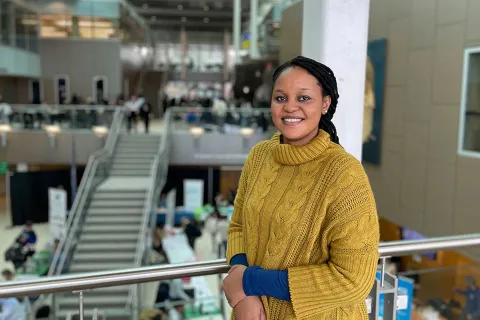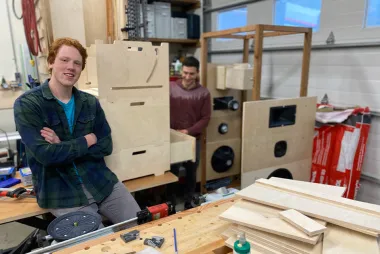Engineering student Chadia Uwamahoro is helping Rwanda rebuild

This article was originally published on UBC Okanagan News.
Engineering doctoral student Chadia Uwamahoro isn't afraid to offer her native Rwanda as an example of what’s possible through truth and reconciliation.
The healing process is ongoing in the central African nation of nearly 14 million people following the 1994 genocide against 800,000 ethnic Tutsis and their supporters by the governing Hutu majority. Uwamahoro was just a year old when the genocide began.
“When the country lost nearly a million people, we went backward,” she said. “We had no other choice than to rebuild.”
Uwamahoro is now a civil engineering doctoral student studying under Dr. Lisa Tobber in the UBC Okanagan Advanced Structural Engineering and Experimental Testing Group. Much of her current path is based on helping a united Rwanda thrive.
The mother of a two-year-old daughter, Aaira, Uwamahoro co-founded a construction consulting business in her hometown of Kigali with her husband, who is also a structural engineer. She said she plans to return to Rwanda and raise her family, grow their business and continue the rebuilding process. She has full faith in the Rwandan people and the direction the country is heading.
“As Africans, we have to learn,” she added. “That’s how we know what happened to our people and our country. It’s easy to divide people to control them. When people are together, it’s hard to control them. They’re able to resist you.”
It shouldn’t come as a surprise that Uwamahoro entered engineering. She always enjoyed math and science. Her father is an entrepreneur who loves to create, she says. She grew up in a busy household in Kigali, also the Rwandan capital city, with three brothers. She wasn’t afraid to insert herself between them, play soccer and get her hands dirty.
It caught her father’s attention, and her parents sent her to the United States to finish high school. Uwamahoro went on to earn a Bachelor of Civil Engineering from the University of Texas at San Antonio in 2016 and remained there to finish her master’s in 2018.
She chose UBC Okanagan for her doctorate primarily because of Dr. Tobber.
“I made my decision after my first meeting with her,” Uwamahoro said. “She’s very eager to learn and is interested in new things, new aspects. She tells you to question everything. I think those are the proper methods for a doctoral student.”
Dr. Tobber was struck by Uwamahoro’s ambition and focus. She came to UBCO so she could one day return home and improve Rwanda.
“I gravitate toward people who show leadership and perseverance,” Dr. Tobber said. “I like people who see the world differently. All of those things really resonated when I met Chadia.”
Uwamahoro’s specific research is around precast concrete buildings and systems, with emphasis on the connections being used with precast concrete shear walls. A precast system is constructed in a plant and transported to the building site, while traditional systems are poured on location.
“Precast is already being used in Canada, especially Ontario,” Uwamahoro said. “It involves multiple different units that need to be connected to act as one building. We’re looking at those connections and how they behave.”
Precast concrete is seen as vital to reducing greenhouse gas emissions and making construction more environmentally friendly. It can be more affordable than traditional concrete buildings, making precast an economical option when addressing the housing crunch.
“There isn’t enough of this type of research happening in the world,” Dr. Tobber said. “It’s vital we adopt new technologies and new materials to help address climate change, housing insecurity and even natural disaster.”
Uwamahoro doesn’t intend to stop at concrete. Her future work, she says, will remain on the pursuit of a Rwandan building code and her consulting company. She wants to continue helping disadvantaged communities with initiatives and programs that help build houses for refugees.
“The Rwandan building code being used right now was taken from the United Kingdom,” she said. “We don’t have one based on current data in Rwanda. I want to be able to create a building code for Rwanda and Dr. Tobber understood that. She was willing to give me the space, and that’s incredible.”
She says that bringing her two worlds together—taking what she learned at UBCO with her home to Africa—is proof everyday Rwandans are invested in their future.
“Rwanda has reconciled,” she said. “The government is consulting people, teaching children what happened and what hatred can do to people. As a country, we don’t want what happened to repeat.
“To quote our president, Paul Kagame, ‘We cannot turn the clock back nor can we undo the harm caused, but we have the power to determine the future and to ensure that what happened never happens again.’”


